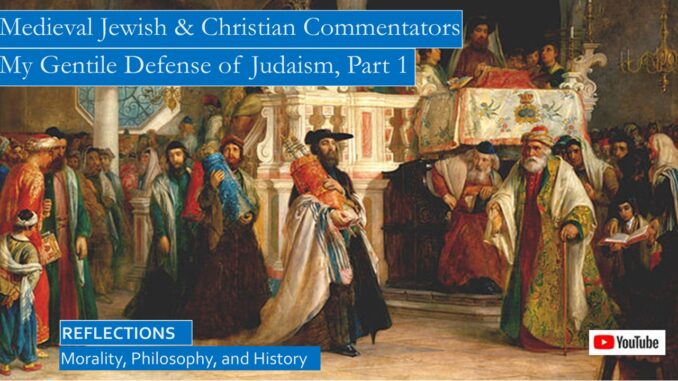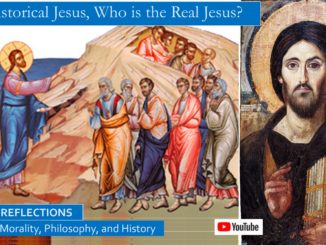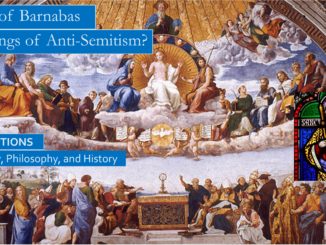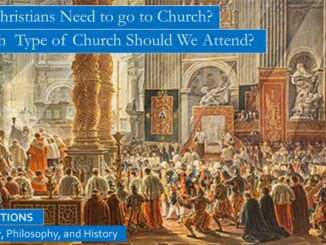
What is the background of the three main medieval Jewish Commentators, Rashi, Rambam, and Ramban, who commented on the Book of Deuteronomy in the Torah, the first five books of the Old Testament?
What are the core principles of Judaism and Christianity? How are they similar? How do these faith traditions differ?
Why do the Jewish versions of the Torah use multiple names for God?
Which Laws should Christians follow? Can Christians draw inspiration from all the Laws in Deuteronomy and the Torah?
How can Deuteronomy be both a Book of the Law as well as a Book encouraging the Love of God and neighbor?
THIS VIDEO: Medieval Jewish and Christian Commentators, My Gentile’s Defense of Judaism, Part 1
https://youtu.be/mN765l5O2f8
Powerpoint Script with Book Links:
https://www.slideshare.net/BruceStrom1/medieval-jewish-and-christian-commentators-my-gentile-defense-of-judaism-part-1
Loving God in Deuteronomy, My Gentile’s Defense of Judaism, Part 2
https://seekingvirtueandwisdom.com/loving-god-in-deuteronomy-and-a-gentiles-defense-of-judaism-part-2/
https://youtu.be/1f-rAs-rBI0
TWO-FOLD LOVE OF GOD AND NEIGHBOR
What is the core directive of both Judaism and Christianity? The two-fold love, that we should both love God with all of our hearts and with all of our souls and with all of our mind and with all of our strength and really with all of our all, and that we should love our neighbor as ourselves. And all else is commentary, as the rabbis teach us.
At roughly the time of Jesus, an inquirer requested of both Rabbi Shammai and Rabbi Hillel, “Convert me to Judaism on condition that you will teach me the entire Torah while I stand on one foot.” Shammai pushed the man away with the building rod he was holding. Undeterred, the man then came before Hillel with the same request. Hillel responded, “That which is hateful unto you, do not do unto your neighbor. This is the whole Torah; all the rest is commentary. Now, go and study.” [1]
Who had the correct approach? Both rabbis were correct, both have valid lessons to teach. Likewise, Christians can learn from both the teachings of the church fathers and the medieval rabbis. One difference between the two faiths is Christianity and their Greek culture wants everything to be logical and fit together and seeks to harmonize any apparent discrepancies in the Holy Scriptures. On the other hand, Judaism seeks to find differing lessons for verses of scripture that seem to conflict. One example is that the commandments for DO NOT COVET are worded differently in Exodus and Deuteronomy, so we can learn from their differing emphasis.
Hillel and Jesus, Reflections on Rabbi Telushkin’s Observations
http://www.seekingvirtueandwisdom.com/hillel-and-jesus-reflections/
Comparing Hillel and Shammai to Jesus
http://www.seekingvirtueandwisdom.com/comparing-hillel-and-shammai-to-jesus/
More Stories and Sayings of Hillel and Shammai
http://www.seekingvirtueandwisdom.com/more-stories-and-sayings-of-hillel-and-shammai/
Jesus, Hillel, and Shammai, Loving God and Neighbor
https://youtu.be/ygxn2qqGnOI
A key work by St Augustine reaffirms this two-fold Love of God and neighbor. St Augustine is my favorite Catholic saint because, in every major work, he explicitly reminds us that this two-fold Love is the core of Christian beliefs. In his foundational essay On Christian Teaching, he teaches us that all Holy Scripture, properly interpreted, must increase in our heart our two-fold Love of God and neighbor, and that if any biblical story appears to violate this two-fold Love, then it MUST be interpreted allegorically.
How do the rabbis interpret the harsh penalties, such as death by stoning and putting out the eyes and limbs of offenders, for some of the various laws in the Torah? They simply say that these strictures emphasize the importance of obeying these moral laws, but that the modern penalties should be reasonable, fitting the crime.
St Augustine: On Christian Teaching, aka On Christian Doctrine, How To Read Scripture
http://www.seekingvirtueandwisdom.com/st-augustine-on-christian-teaching-how-to-read-scripture/
https://youtu.be/uQCnAJMPoos
The best example of the allegorical interpretation of the Old Testament is the famous verse in Psalm 137:
O daughter Babylon, you devastator!
Happy shall they be who pay you back
what you have done to us!
Happy shall they be who take your little ones
and dash them against the rock![2]
This is a favorite verse of the Eastern Monastic Church Fathers in the Philokalia, they interpret this verse as exhorting us to eliminate all the sins in our life, both large and small.
The Philokalia, Classics by the Eastern Church Fathers, the Love of the Beautiful
https://seekingvirtueandwisdom.com/introduction-to-the-philokalia-the-love-of-the-beautiful/
https://youtu.be/rKVBhdHWHGI
The rabbinical example is the Mitzvah about the red heifer. The precise meaning of the phrase “red heifer” mentioned in a law in Deuteronomy is lost in the sands of history, so it is interpreted by the rabbis as teaching us that we should obey all the commandments of God, even when they do not make sense to us. Likewise, although Christians believe that many of the dietary, ritual, and festival laws are no longer binding, a spiritual allegorical interpretation remains.[3]
RASHI, RAMBAM, AND RAMBAN: MEDEIVAL JEWISH COMMENTATORS
This will be an introduction to our reflections on how the major of the last book of the Torah, Deuteronomy, is both a book of the Law as well as a book exhorting us to Love God in close to twenty passages. We will also examine the commentaries by the medieval rabbis Rashi, Rambam, also known as Maimonides, and Ramban, also known as Nachminides. Rabbi Ibn Ezra is also a highly esteemed medieval rabbi, but his works are famously terse.
Born in the eleventh century in France, Rashi was the most esteemed commentator of the Jewish Torah, as well as the other books of the Jewish Bible and the Talmud. Much of the rabbinical writings discuss his commentary. We use the Jewish Bible, the Medusa Chumash Torah, that has both the Hebrew and the English, with Rashi’s commentary, and with commentary of his often-terse commentary. Rashi’s commentary is also available on the internet. [4]
https://www.chabad.org/library/bible_cdo/aid/63255/jewish/The-Bible-with-Rashi.htm
Rambam, born in Spain in the twelfth century in Moorish Muslim Spain, was perhaps an equally influential rabbi. He summarized the Oral Law in an influential fourteen-volume Mishneh Torah. One of the major works of Rambam is his summary from the Talmud of the 613 Mitzvah, with 248 positively stated commands, followed by 365 negative commands. The 248 commands correspond to how many bones the ancients thought were in the human body, though we now know there are many more, and the 365 days of the year. Each of the Ten Commandments is included, and all of the other commandments elaborate on one or more of these Ten Commandments. He also penned the Guide to the Perplexed, which was a Jewish reflection of Aristotelean philosophy.[5]
Ramban, or Nachminides, living in the thirteenth century, was born in Christian Spain soon after the years of the Reconquest from the Muslim Moors. He defended Judaism in a disputation with Christians, arguing persuasively that the Christian belief in the Trinity doesn’t make any logical sense. And of course, this greatly offended the Spanish church authorities, and he felt compelled to emigrate to the Middle East. But he does make a good point, that Christianity doesn’t make any logical sense. [6] Christianity is based on the thought that Jesus both God and man, part divine and part human. And that we have a Trinity of God the Father, God the Son, and God the Holy Ghost. Yet we have one God, which makes no logical sense. There is a verse in the New Testament that says that the teenage Jesus learned, but if God is omniscient, knowing everything, how can the young Jesus learn? Think about that too hard and you will tangle yourself up into all kinds of conundrums. It’s best not to interpret that verse too heavily, just accept it.
How does St Augustine make sense of the Christian Trinity? He summarizes its essence in seven declarations:
- The Father is neither the Son nor the Holy Spirit.
- The Son is neither the Father nor the Holy Spirit.
- The Holy Spirit is neither Father nor the Son.
- God the Father is God.
- God the Son is God.
- God the Holy Spirit is God.
- There is only one God. XXX FN
Furthermore, the Ecumenical Councils and Church Fathers teach us that He is not only is Jesus equally God and equally man, but also that free will is also equally divine and e equally human. You can argue that Christianity invented theology to try to explain the Trinity of God.[7]
Judaism has fewer doctrinal differences than Christianity, the differences between Reformed, Conservative, and Orthodox Jews are generally disagreements on practice, to what degree the laws should be followed literally, or whether the meaning of some laws are more allegorical. This may reflect that Jews are less polemic about their differences, less will to attack others over disagreements over interpretation. For example, when Ramban disagrees with certain teachings of Rashi, he never personally attacks the venerable commentator, but rather speaks of him with profound respect. This, and the Jewish tendency to welcome varying interpretations, enables Judaism to avoid some of the polemic arguments that are so common in Christianity.
MY PHILOSOPHY AND FAITH JOURNEY
Why are we interested in this topic? Much current and classic Christian theology begins with the premise that Jesus is a God of mercy, while the Old Testament Father is a God of judgment, and that, as St Paul exhorts, “the letter” of the law “kills, but the Spirit gives life.”[8]
My reflections are based solely on my reading: I’ve only attended one bar mitzvah and one synagogue service. That was not possible in the ancient world before the invention of the printing press, if you wanted to study the Torah using the Talmud and the writings of the Jewish rabbis, you had to visit the synagogue. Often you just could not study these works without becoming involved in the synagogue. Christians who mixed these faiths we called Judaizers, and this practice was condemned by both St Paul the Apostle and St John Chrysostom, though we observed that Chrysostom’s criticisms crossed over into anti-Semitism. This is why these condemnations are directed towards the Judaizers among the Christians rather than the Jews themselves. Unfortunately, in medieval Europe, these attitudes evolved into virulent anti-Semitism by all Christians, and possibly the most extreme form was the anti-Semitism of Martin Luther.
Epistle of Barnabas, Beginnings of Anti-Semitism?
http://www.seekingvirtueandwisdom.com/epistle-of-barnabas-blog-1/
https://youtu.be/J8cxz5uUvdw
John Chrysostom, Justin Martyr, and the Church Fathers Preach Against the Judaizers and the Jews
https://www.seekingvirtueandwisdom.com/the-church-fathers-preach-against-the-judaizers/
https://youtu.be/fVVyupNwydw
Martin Luther’s Catechisms on Do Not Envy, and Confronting Luther’s Anti-Semitism
http://www.seekingvirtueandwisdom.com/martin-luther-large-catechism-on-decalogue-do-not-envy-and-anti-semitism/
https://youtu.be/FQmBggJAhKg
St Justin Martyr, Dialogue with Trypho, Blog 3, Justin Is Converted
http://www.seekingvirtueandwisdom.com/st-justin-martyr-dialogue-with-trypho-blog-3-justin-is-converted/
Justin Martyr, Dialogue With Trypho the Jew on Circumcision and Jesus
http://www.seekingvirtueandwisdom.com/st-justin-martyr-dialogue-with-trypho-the-jew-on-circumcision-and-jesus/
St Justin Martyr’s Dialogue With Trypho, a Jew, on Circumcision, Jesus, and Philosophy
https://youtu.be/AafwB0tA5a8
I have always been baffled by those who claim that Christians no longer need to study the Law, because if you seek to learn how to live a godly life, don’t you want to know how? Similarly, I am baffled by Protestants who likewise neglect the study of the Church Fathers and the Catholic Catechism for similar reasons. This we discuss in our Channel Philosophy video and blog.
Our reflections are respectful to all mainstream Judeo-Christian traditions, we prefer to learn from these traditions how to live a godly life, we are reluctant to criticize and find fault so we can argue that our traditions are superior. St Augustine and I both agree, that you need to attend a church, you need to choose a faith tradition. But for my internet persona, I prefer to not reveal my denomination.
In that spirit, the criticisms of the Pharisees made by Jesus in the Gospels seem like insider criticisms. You can be harsher and you’re self-criticizing than you can when you’re criticizing people outside your tradition.
Our Reflections on Morality, Philosophy, and History: Ancient and Modern Classics
http://www.seekingvirtueandwisdom.com/our-philosophy-for-this-blog-reflections-on-ancient-and-modern-classics/
https://youtu.be/Si0TsO5bNr0
But this exhortation to value the spirit over the letter of the law is also exclaimed in the Old Testament, as King David sings in the Penitential Psalm bewailing his sin with Bathsheba:
You have no delight in sacrifice;
If I were to give a burnt offering, you would not be pleased.
The sacrifice acceptable to God is a broken spirit;
a broken and contrite heart, O God, you will not despise.[9]
This exhortation is repeated many times by the prophets.
CHRISTIAN ATTITUDES AND JEWISH EXEGESIS
Does the Christian Gospel reject the Jewish Law, or does the Christian Gospel reaffirm the Jewish Law?
Early in its history, Christianity faced the heresy of the Gnostic Marcion, who declared that the judgmental god of the Old Testament was a vengeful demiurge, and that Jesus was the newly righteous god, which led him to declare that the Christian Bible should omit the Old Testament. Marcion’s Bible contained only ten Pauline epistles and an edited version of Luke.[10]
Marcion’s teachings were rejected by the early church. Early Church Fathers, including St Irenaeus and St Justin Martyr, embraced the Old Testament as part of the Christian Scriptures.
St Irenaeus On Heresies, Eusebius and Modern Scholars, and Catholic Catechism
http://www.seekingvirtueandwisdom.com/st-irenaeus-on-heresies-eusebius-and-modern-scholars-and-catholic-catechism/
St Irenaeus Blog 1 Against Heresies, Introduction
http://www.seekingvirtueandwisdom.com/st-irenaeus-blog-1-against-heresies-introduction/
St Irenaeus Blog 2 Against Heresies
http://www.seekingvirtueandwisdom.com/st-irenaeus-blog-2-against-heresies/
St Irenaeus: On Heresies, Early Church Father, Future Doctor of the Church
https://youtu.be/bG1okLOum2E
St Justin Martyr, Dialogue with Trypho, Blog 3, Justin Is Converted
http://www.seekingvirtueandwisdom.com/st-justin-martyr-dialogue-with-trypho-blog-3-justin-is-converted/
Justin Martyr, Dialogue With Trypho the Jew on Circumcision and Jesus
http://www.seekingvirtueandwisdom.com/st-justin-martyr-dialogue-with-trypho-the-jew-on-circumcision-and-jesus/
St Justin Martyr’s Dialogue With Trypho, a Jew, on Circumcision, Jesus, and Philosophy
https://youtu.be/AafwB0tA5a8
What is another key difference in emphasis between Christians and Jews when they study the books of the Old Testament? While Jews reflect on the entire Torah during the annual readings in their Synagogue services, and recite the Shema, Christians skip around, favoring those parts that point to Jesus Christ.
One overriding principle of Jewish exegesis is the most important commands are repeated repeatedly in both positive and negative forms. One example of this is the negative commandment DO NOT MURDER: the positive form of the command is to love your neighbor as yourself. Of course, Christians can include the number of times a command is repeated in the Old Testament to judge their importance.
Another principle of both Jewish and Christian biblical exegesis is you should not interpret any verse by itself. You should read the chapters surrounding the verse, then interpret it in the context of first the book as a whole, then the Bible as a whole. Another tendency that makes me cringe is when people want to look up the meaning of biblical words in the Merriam-Webster dictionary. Don’t do that! Find out the biblical meanings of the words.
The Torah, the first five books of the Bible, the Psalms, and the Synoptic Gospels, Matthew, Mark, and Luke, are similar in style: they have many couplets where the second sentence rephrases and amplifies the first sentence, poetry that echoes thoughts and beliefs rather than syllables.
One good example is the first Psalm, which is a collection of couplets whose lines rhyme in thought rather than in the spoken word:
Happy are those who do not follow the advice of the wicked,
or take the path that sinners tread,
or sit in the seat of scoffers,
but their delight is in the law of the Lord,
and on his law they meditate day and night.
They are like trees planted by streams of water,
which yield their fruit in its season,
and their leaves do not wither.
In all that they do, they prosper.
The wicked are not so,
but are like chaff that the wind drives away.
Therefore, the wicked will not stand in the judgment,
nor sinners in the congregation of the righteous,
for the Lord watches over the way of the righteous,
but the way of the wicked will perish.[11]
The First Psalm celebrates the Law as Gospel, our delight is to study the Law. As CS Lewis in his commentary on the Psalms observes, not only are we to obey the Law as expressed in the Decalogue and the other laws, but our delight is also to study the Law, to meditate on the Law day and night.
When we reflect on the two-fold Love of God, we must remember the spiritual struggle with the demons that CS Lewis depicts in his Screwtape Letters. The deceiver would rather that we not be religiously devout, but if he fails in this effort, the deceiver seeks that we should instead be judgmental and hypocritical. Likewise, the deceiver would rather that we not study Scripture, but if he fails in that effort, the deceiver seeks that our studies would be corrupted by conceit and pride in our learning, which are dangers for both Jews and Christians.[12]
Another example is this verse in Matthew that follows the Lord’s prayer:
For if you forgive others their trespasses,
your heavenly Father will also forgive you,
but if you do not forgive others,
Neither will your Father forgive your trespasses.[13]
In the Jewish tradition, the word of God is holy and should not be said, so we do not know the ancient pronunciation for sure, many English translations render it as Jehovah or Yahweh. But in the Hebrew Bible, this holy word is replaced by either Adonoy, for the merciful aspect of God, or Elohim, for the judgmental aspect in God. Wherever the English translation renders the name as Lord, Lord; in Hebrew, the underlying Hebrew is rendered as Adonoy, Elohim.
Similarly, in one of the most famous icons of Jesus in the fifth century from the oldest continuously occupied monastery in the world at Mount Sinai in the deserts of Egypt, one half of His face shows the compassionate Jesus, while the other half shows Jesus, the judge, who separates the lambs from the goats at the end of the world.
ANCIENT ISRAEL WAS A WARRIOR CULTURE
When reading the Old Testament, remember that both the ancient Greek and ancient Jewish city-states were ancient warrior cultures. Unlike today when we look forward to a retirement funded by Social Security, in the ancient world you worried that a hostile enemy would plunder your city-state, rob you of all your possessions, execute all military-age men, and enslave the women and children. The Babylonians were uncharacteristically kind when they deported the Jews, though the Psalms hint they were guilty of many cruelties. However, the Babylonians did permit the Jews to settle in their own communities in Babylon. There they might have been the equivalent of serfs, but their independent community was sufficiently prosperous to support rabbis who studied the Torah.
The Assyrians were crueler, perhaps they obliterated the culture of the ten lost tribes of Israel by enslaving them. Perhaps this is why the Ten Lost Tribes of Israel were lost in the sands of history. In the cold and cruel ancient world, you cannot expect the ancient Jews to love their enemies. This means that the laws in the Torah command the Hebrews to love their Hebrew neighbors.
Ancient Warrior Culture, Blog 1, War, Slaves, and Concubines in Ancient Greece, Rome, and Israel
https://seekingvirtueandwisdom.com/ancient-warrior-societies-blog-1-the-warrior-ethos-of-ancient-greece/
Ancient Warrior Culture, Ancient Greece, Rome, and Israel
https://youtu.be/7QAZ_s6zw4E
Ancient Warrior Societies, Blog 2, Greek and Roman Armies and Navies
https://seekingvirtueandwisdom.com/ancient-warrior-societies-blog-2-greek-and-roman-armies-and-navies/
Ancient Warrior Societies, Blog 3, World of the Old Testament
https://seekingvirtueandwisdom.com/ancient-warrior-societies-blog-3-world-of-the-old-testament/
Ancient Warfare in Ancient Greece, Rome, and Israel. Did Joshua Massacre Pagans in Promised Land?
https://youtu.be/9xKxqAbJ2qY
Ordinary Life and Justice in Ancient Athens, Rome, and Israel
http://www.seekingvirtueandwisdom.com/ordinary-life-and-justice-in-the-ancient-world/
https://youtu.be/vl8KGL5Yx2w
Ordinary Life for Romans Under Stoic Emperor Marcus Aurelius
https://seekingvirtueandwisdom.com/ordinary-life-for-romans-under-stoic-emperor-marcus-aurelius/
https://youtu.be/9hgSbcgbCJw
Summary of Homer’s Iliad: Warrior Culture of Ancient Greece
https://seekingvirtueandwisdom.com/summary-of-homers-iliad-warrior-culture-of-ancient-greece/
https://youtu.be/6C5znDxvpQ8
Iliad, Blog 1, Why Should a Christian Read the Iliad?
http://www.seekingvirtueandwisdom.com/iliad_blog01/
The Iliad, the Basis of Greek Culture and the Western Philosophical Tradition
https://youtu.be/DpmuhZJUJn0
Iliad Blog 2, Captured Concubines in the Iliad and the Torah
http://www.seekingvirtueandwisdom.com/iliad_blog02/
The Iliad, blog 4, Briseis, Chryseis, Aren’t all Concubines the Same?
http://www.seekingvirtueandwisdom.com/the-iliad-blog-4-briseis-chryseis-arent-all-concubines-the-same/
Concubines in the Iliad, Old Testament and Christian Tradition
https://youtu.be/bGHHD7XTvr0
Iliad, Blog 3, Visiting the Enemy Camp, Greeks vs Indians
http://www.seekingvirtueandwisdom.com/iliad-blog-3-visiting-the-enemy-camp-greeks-vs-indians/
The Warrior Cultures of the Iliad and the American Indian, Bravely Visiting the Enemy Camp
https://youtu.be/ynIx-AVI2f8
The Iliad Blog 5, the Tide of Battle Turns Against the Greeks
http://www.seekingvirtueandwisdom.com/the-iliad-blog-5-the-tide-of-battle-turns-against-the-greeks/
The Iliad Blog 6, Embassy to Achilles, Oration, Failed Meeting
http://www.seekingvirtueandwisdom.com/the-iliad-blog-6-embassy-to-achilles-oration-failed-meeting/
The Iliad Blog 7, the deaths of Patroclus and Hector
http://www.seekingvirtueandwisdom.com/the-iliad-blog-7-the-deaths-of-patroclus-and-hector/
The Iliad of Homer: Glory, Honor, Madness and Futility of War
https://youtu.be/7lI2ZQ50wRc
Even in the ancient world, these cultures lost their warrior ethos several generations after they were conquered by an empire, whether it be the Persian Empire in ancient Greek history, or the Roman conquest of Judea before the time of Christ. Along with losing their warrior ethos, they also lost their fear that neighboring powers might attack and defeat their city-state since they were under the protection of Rome. This meant that, unlike Moses, Jesus could exhort us and his followers to love both our enemies and our neighbors.
Another confirmation that ancient Israel was a warrior culture is witnessed in the Song of the Sea in Exodus, sung by the Jews after they crossed the Red Sea. Scholars speculate that this is one of the oldest verses in the Old Testament.
Song of the Sea in Exodus:
I will sing to the Lord,
for he has triumphed gloriously;
horse and rider he has thrown into the sea.
The Lord is my strength and my might,
and he has become my salvation;
this is my God, and I will praise him,
my father’s God, and I will exalt him.
The Lord is a warrior;
the Lord is his name.[14]
We still think that way today, we still want God to help us to be successful in our career, help us be successful in our marriage, and help us to be successful in our life. But whether you are a Jew or a Christians, your faith should be deeper than merely selfish demands for success, our faith should instead be anchored in our Love of God and love of our neighbor regardless of the success or defeats we suffer in our lives. Love should trump prosperity, Just because life denies us prosperity and brings us suffering instead, we should still Love God and love our neighbor regardless of the successes or failures we experience in our lives. Love should trump prosperity. Even if life denies us prosperity, bringing us suffering instead, we should still Love God and love our neighbor, because after all, all else is commentary.
This reflection introduces our reflection on how Deuteronomy is first a book of Love, exhorting us to Love God in about twenty verses.
YT
DISCUSSING THE SOURCES
We have another video reflecting on the commentaries of the medieval rabbis, Rashi, Rambam, and Ramban, plus many modern summaries of the modern collections of the moral teachings from the Talmud and Torah, the first five books of the Old Testament.
Book Reviews, Commentaries of Torah and Talmud, Medieval Rabbis and Modern Rabbis and Scholars
http://www.seekingvirtueandwisdom.com/book-reviews-commentaries-of-torah-and-talmud-medieval-rabbis-and-modern-rabbis-and-scholars/
https://youtu.be/mvstpk88TxI
[1] Joseph Telushkin, “Hillel, If Not Now, When?,” (New York: Schocken Books of Random House, 2010) p. 19, from Shabbat 31a.
[2] https://www.biblegateway.com/passage/?search=Psalm+137&version=NRSVCE
[3] https://en.wikipedia.org/wiki/Red_heifer and https://www.chabad.org/parshah/article_cdo/aid/2620682/jewish/What-Was-the-Red-Heifer.htm
[4] https://en.wikipedia.org/wiki/Rashi and https://www.chabad.org/library/article_cdo/aid/111831/jewish/Rashi-Rabbi-Shlomo-Yitzchaki.htm
[5] https://en.wikipedia.org/wiki/Maimonides
[6] https://en.wikipedia.org/wiki/Nachmanides
[7] https://en.wikipedia.org/wiki/Council_of_Chalcedon
[8] https://www.biblegateway.com/passage/?search=2+Corinthians+3%3A6&version=NRSVCE
[9] https://www.biblegateway.com/passage/?search=psalm+51%3A16-17&version=NRSVCE
[10] https://en.wikipedia.org/wiki/Marcion_of_Sinope
[11] https://www.biblegateway.com/passage/?search=Psalm+1&version=NRSVCE
[12] CS Lewis, Reflections of the Psalms, included in The Beloved Works of CS Lewis (Edison, NJ, Inspirational Press and Harcourt, Brace & Co, 2004, 1955), Chapter VI, p. 360.
[13] https://www.biblegateway.com/passage/?search=Matthew%206&version=NRSVCE
[14] https://www.biblegateway.com/passage/?search=exodus+15%3A1-3&version=NRSVCE




1 Trackback / Pingback